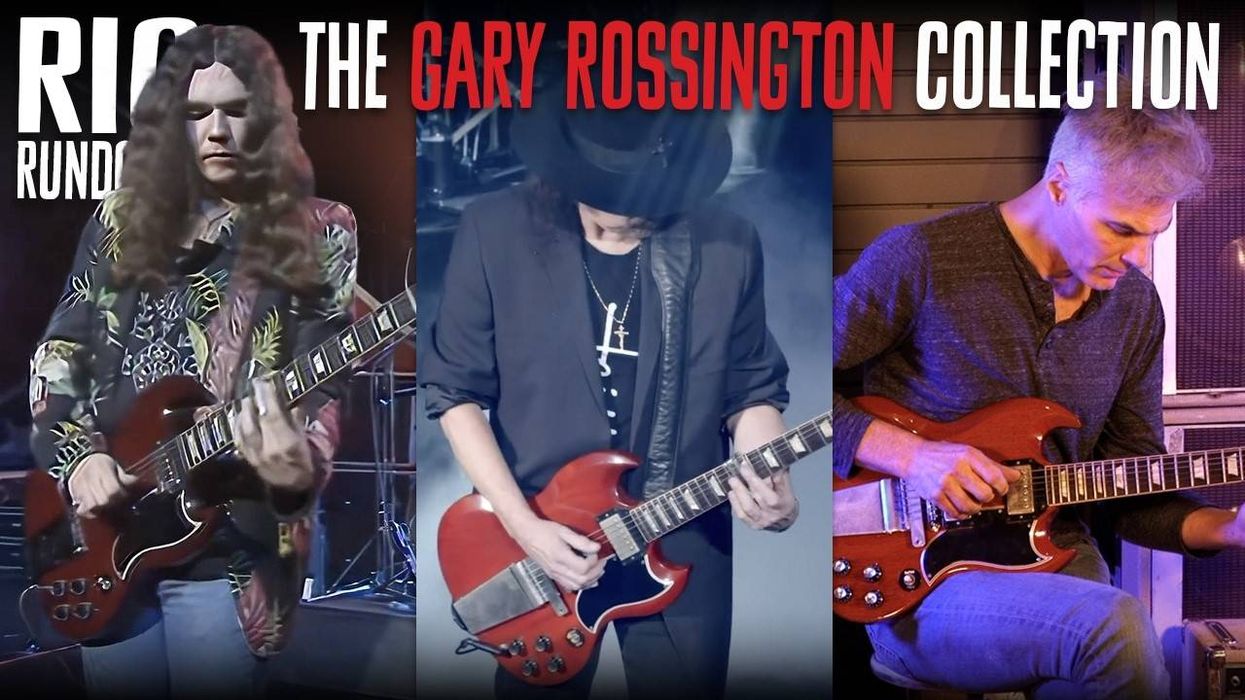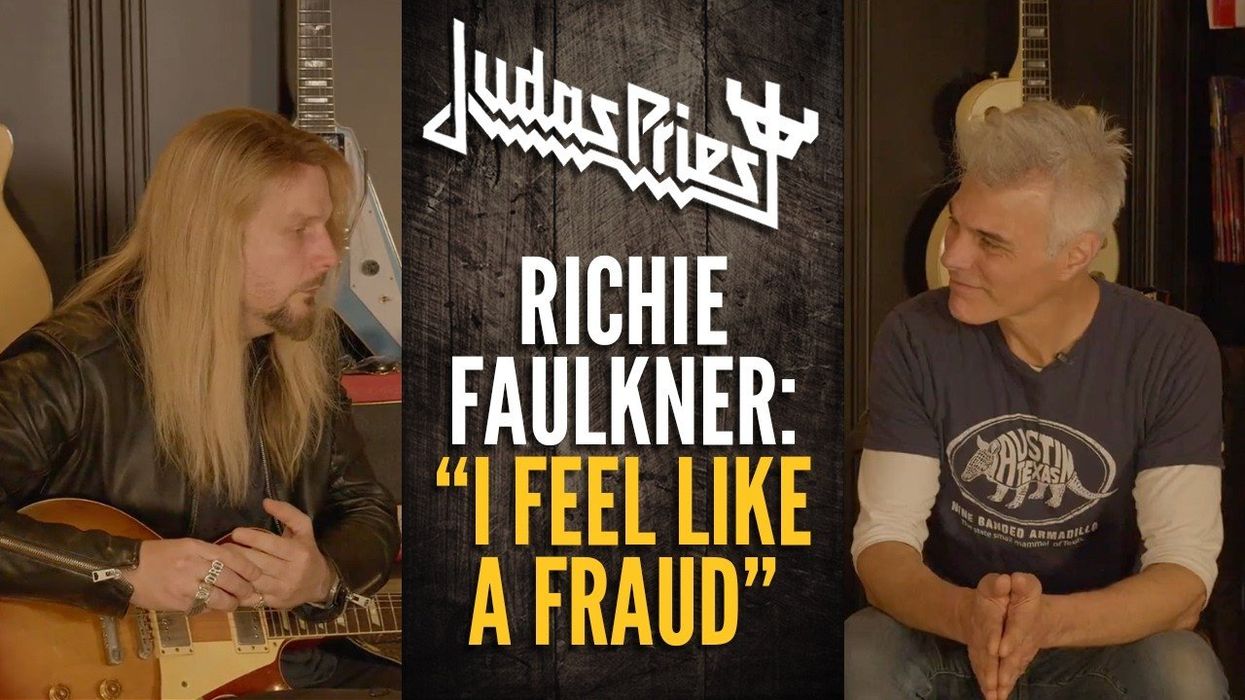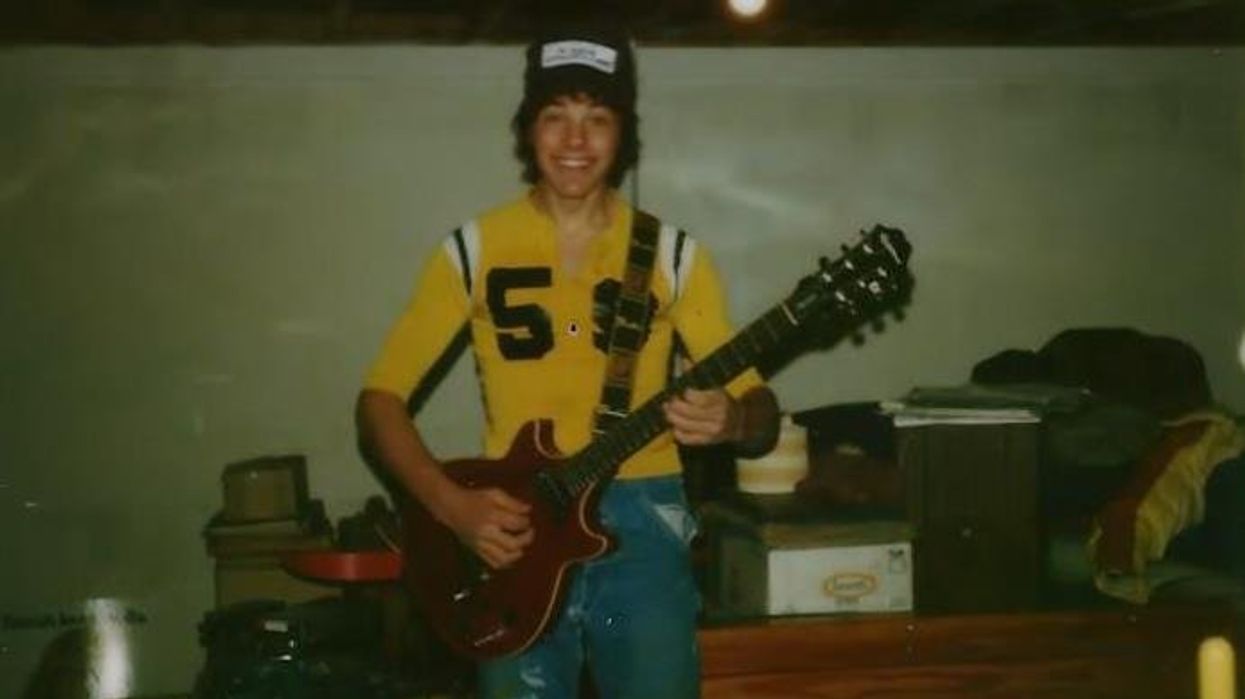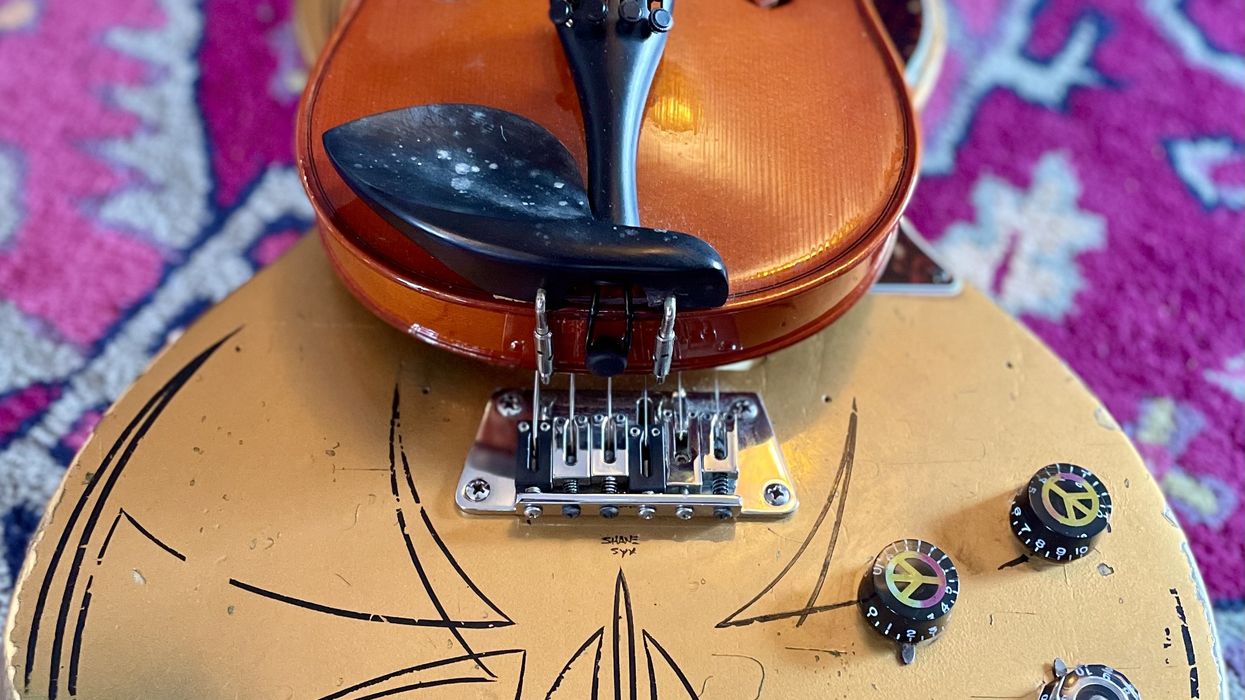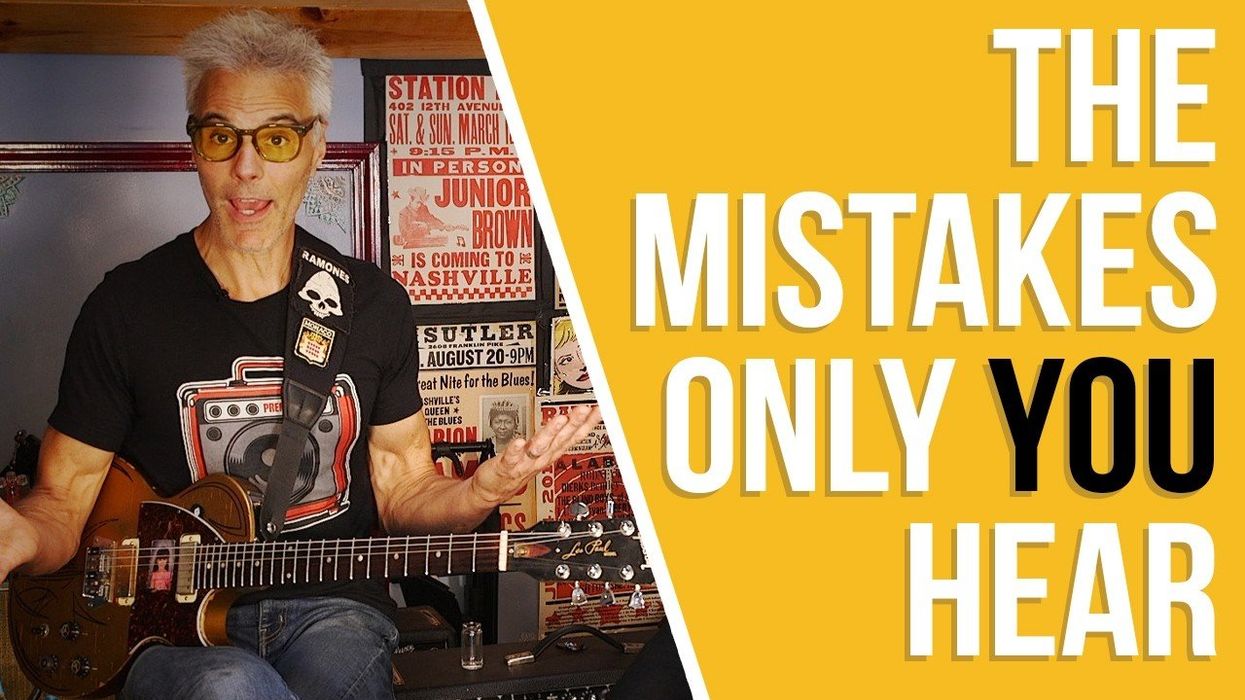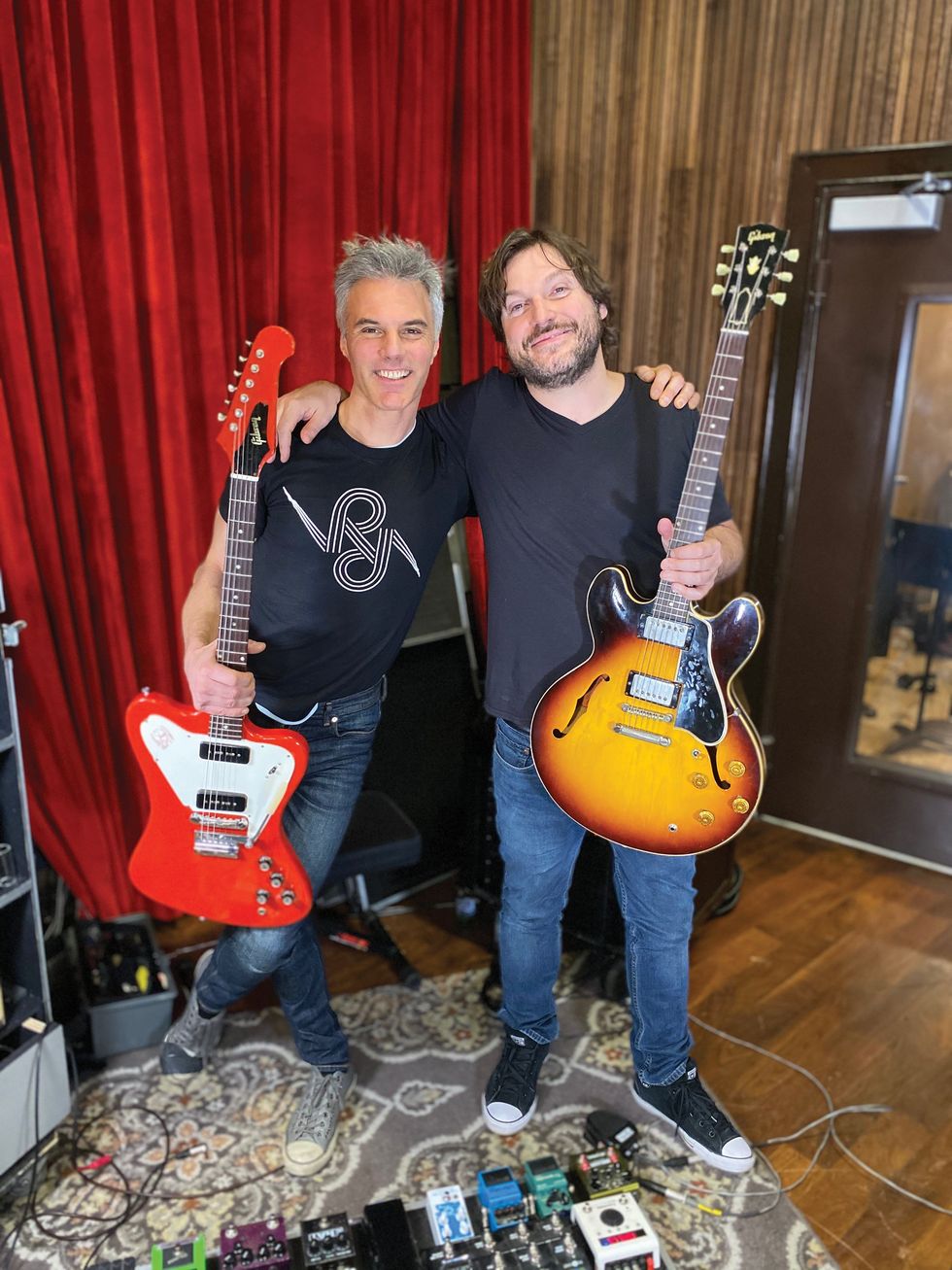Over the course of just two months, guitarist Tom Peterson from Cincinnati, Ohio, was diagnosed with testicular cancer and lost both his job and the unborn child that he and his wife had been expecting—their first. The one bright spot that year came at Christmastime, when Peterson received a special gift from his family: a PRS Mira that has since become the prize of his guitar collection for reasons difficult to quantify.
"You never think that this inanimate object is going to have such a mental connection with you and get you through your darkest hours," Peterson shared in PG's Conversations in the Key of Life podcast ("Episode 3: Guitar as Therapy," June 2016).
"I can't tell you how many times—especially dealing with the post-traumatic-stress aspect of things, when the triggers come around—that I've just picked up the Mira, laid on my back, and plunked around on it. Nothing in particular … just me and the guitar. When you feel like your body can't move on to do anything else, it seems like the music—that connection—drives you just for that brief moment while you're contemplating that next string bend. You forget everything else."
But beyond the scores of untold private battles like Peterson's, where music becomes both shield and weapon against encroaching darkness, there are many other instances where guitar has played a more oblique role in therapy, whether through 6-string stars playing benefits for rehab centers, selling their instruments and donating the proceeds, or, in Eric Clapton's case, both. Anecdotes and superstars aside, the guitar has found a more institutional place in the healing process through the relatively new field of music therapy.
Roots and Branches
To get an overview and history of music therapy and understand the guitar's place in it, we chatted with health professionals who administer this treatment on a daily basis. One such person is Dr. Robert Krout, professor and director of music therapy in the Meadows School of the Arts at Southern Methodist University in Dallas, Texas. Krout also teaches guitar online and has taught at the National Guitar Workshop, as well as guitar workshops around the world.
"Music therapy as a profession started in 1950," explains Krout. "You use music-based experiences in the relationship with the therapist to help achieve desired health outcomes, whether they be physical goals, social rehabilitation, helping with developmental issues, and so on."
Krout notes that people are usually referred to a music therapist by a psychiatrist, nurse, social worker, or health insurance company. The therapist then conducts a comprehensive assessment to see if the referred individual might benefit from music therapy. "The patient doesn't necessarily have to be able to play or sing," says Krout, "but the therapist would assess whether music might be beneficial for them based on their needs, and also based on how they respond to music either actively or passively."
Potential music-therapy beneficiaries run the gamut from parents anticipating an addition to their family to individuals who've recently lost a loved one—and all sorts of related situations in between: Krout works with expectant mothers and couples in Lamaze training, using music to help with the timing of contractions. He also works with patients who are nearing the end of their lives or are in hospice care. Music therapy can also help bereaved siblings, spouses, children, grandchildren, and other survivors with grief healing. Meanwhile, music can often stimulate forgotten memories or buried emotions in patients with Alzheimer's or cognitive impairments. Music therapy can also be a great way to communicate with children on the autism spectrum, especially those who are nonverbal.
"I work with people with eating disorders, and often they have a series of verbal defenses that shield them from how they're feeling. When we do music-based experiences, many of those defenses fall away and they have an emotional reaction to the music—even when they try not to." —Dr. Robert Krout
The work that Dr. Krout and others are doing with music therapy is often effective where other forms of therapy have come up short—for instance, with clients who lack the verbal skills to benefit from talk-based therapy. Further, it can often make inroads with patients who have highly developed verbal skills that have, for one reason or another, proved an impediment to treatment.
"I work with people with eating disorders, and often they have a series of verbal defenses that shield them from how they're feeling," says Krout. "When we do music-based experiences, many of those defenses fall away and they have an emotional reaction to the music—even when they try not to. We can sometimes use that emotional reaction to take the discussion deeper into some of the issues they're facing."
Music therapy has been found to be very helpful in treating post-traumatic stress disorder (PTSD), particularly that suffered by troops returning from combat. Thanks to George Hauer—whose organization Operation: Music Aid supplies thousands of musical instruments to recovering military and armed forces personnel—we chatted with music therapist Bobbi Blake about her experience working with veterans at a VA medical center in Connecticut. She began by explaining that music therapy had its beginnings in the U.S. Department of Veterans Affairs system after World War II.
"They found when they played music for the veterans it was very helpful in calming them down and soothing them," Blake says. "They started to investigate it more, and that began the music-therapy research in the '50s. There has been extensive research ever since. Now, they're doing neurological work on how music affects the brain. In working with veterans with PTSD, I'm trying to use music to help engage their coping skills and self-expression."
Like patients with eating disorders, PTSD patients often have a hard time expressing the multitude of profound, overwhelming feelings bubbling just beneath the surface. They can become socially isolated or be fearful of being around other people, crowds, and trying new things.
"Bringing them together to play music is a wonderful way to have them be with other people in a safe place and learn a skill that's going to help them with anxiety, mood swings, and relaxation," she adds.
Music therapy can play an important role in treating those with substance addictions. Paul Pellinger, one of the founders of Recovery Unplugged (a Florida-based rehab center), uses music to engage clients in different ways. For example, the center organizes live performances by famous musicians, who share stories and songs related to their own issues with drug addiction and alcoholism.
The program incorporates music as early as the pre-assessment process. Before being accepted, a prospective client is asked about his or her favorite genre of music. "If they say, 'classic rock,' I'll ask if there is a particular song that describes their life," says Pellinger. "When I pick them up [to bring them to the center], I have that song playing in the van. Right away, rapport is established and they feel heard versus being yelled at. When they get to our facility, we don't have to deal with a two-week adjustment to the new environment."
Like people with PTSD or eating disorders, many addicts have trouble accessing their emotions. But music can often be a gateway through those mental walls. "Identifying what you think or feel is an obstacle for most people in general, and it's especially difficult for addicts—but I guarantee you somebody has written a song about it," Pellinger says. "We often let song lyrics be the catalyst to verbalize what's going on. We're using music not only to engage the clients, but also to make recovery more of a payoff than using drugs. If you look at [a scan of] the brain after somebody takes a hit of crack cocaine, it lights up similar to how it does after hearing a simple chord change."
Guitar in Therapy

Dr. Robert Krout from Southern Methodist University (center) poses with a class that includes special-needs students at the Hope Town School on Elbow Cay island in the Bahamas.
When music therapy began in 1950, it traditionally employed piano as the accompanying instrument. But at the same time, electric and acoustic guitars were becoming mainstream instruments. Guitar gained more popularity and began to be used, in part, because it was portable. As a teacher of guitar, Krout has a unique view on the instrument's special place in music therapy.
"Clients of different ages and needs are very attracted to the guitar—the look of it and sound of it," he says. "I've worked with emotionally disturbed teenagers who normally would not have any reason to relate to me, but if I walk in with a Fender Stratocaster they relate to that. So the guitar can be used as the go-between. I do a lot of songwriting for music therapy, and the acoustic guitar is a musical instrument I can hold while sitting across from the client. They relate to the guitar, which creates a therapeutic space, and then we can safely do other things with singing, lyric discussion, or songwriting. With autism, it might be the way the guitar smells. A person with a psychiatric syndrome might have played guitar when they were younger, before the disease took over, and they connect to that."
To maximize effectiveness, Krout adapts his choices of instrument and songs to the background of the patient. For example, if a patient is a baby boomer, he may rely on the guitar-based music of the '60s. Meanwhile, if radio hits from the 1950s were the soundtrack of his nursing-home patients' youth, Krout might use Buddy Holly songs as an emotional connection.
The guitar also figures prominently in Blake's work with the Connecticut VA health system. Perhaps the country's best-known nonprofit working with veterans via the 6-string is Guitars for Vets, which provides a free guitar and lessons to veterans through local chapters set up all over the country from its base in Milwaukee, Wisconsin. In contrast, Blake's Six Strings for Soldiers program is much smaller and locally focused, with more of an emphasis on the music-therapy side than on the guitar-centric aspects.
"With an instructor, the primary concern is about instrumental skills, like teaching someone how to play chords, rhythms, or notes," she says. "I'm more concerned about how playing guitar is helping them with their coping skills and stress."
Blake says one of the most rewarding parts of working with Six Strings for Soldiers is that patients use what they've learned when they return home. If they start to get anxious, they pick up the guitar and it calms them. She also finds that even small improvements in learning the instrument quickly reward patients with increased self-esteem.
"Within four weeks it's possible to teach somebody how to play some I-IV-V chord songs," says Blake. "And to accomplish that is very exciting! Guitar is, of course, very complicated to play well—as any instrument is—but for a beginner it's very accessible. It can be particularly effective with isolation issues. It's empowering for socially isolated and fearful PTSD patients when they walk around with a guitar, because it's like walking a dog. People say, 'That's a nice dog' or 'What kind of dog is that?' Similarly, they say, 'You play guitar?' The patient may then say, 'Well, I'm learning,' and it encourages a conversation."
When they leave our facility, we don't just give them a certificate and coin and tell them not to drink, and to go to meetings." —Paul Pellinger
Meanwhile, Pellinger from Recovery Unplugged—which has centers in Austin, Texas, and Fort Lauderdale—has yet another perspective. As the center's name implies, acoustic guitar figures prominently in its treatments. Three or four guitarists work full-time with the program. One of the musicians on staff is Richie Supa, a songwriter who has worked with Gladys Knight & the Pips, Bon Jovi, and Aerosmith—and who performs acoustic sets of songs about addiction and recovery for Recovery Unplugged patients.
But Recovery Unplugged clients don't just consume music, they can also make it. The centers offer musical workshops where Supa and other staff members help interested patients learn to create songs or take their guitar playing to the next level. Recovery Unplugged even found a way for clients to take their musical experiences home after completing treatment by providing a recording studio where patients can create soundtracks of their stay. The soundtracks can be any combination of prerecorded songs they've chosen, performances they've witnessed, or tunes they've performed or written.
"When they leave our facility, we don't just give them a certificate and coin and tell them not to drink, and to go to meetings," Pellinger says. "We give them earbuds and an MP3 player. Music is used as a catalyst for recovery, whether to help them be grateful, call their sponsor, or remember the consequences of using. For instance, Richie Supa wrote a song called 'I Got This.' That's one of the things addicts say when someone asks for their car keys because they are in no shape to drive—'Go away, I got this.' The song was on the soundtrack of a client who graduated from our treatment center. He was on his way to use drugs instead of going to a meeting. He was thinking, 'I got this,' when the song reminded him he didn't have 'this' and should go to a meeting."
Of course, Recovery Unplugged isn't the only music-therapy center that celebrates the unique attributes of flattops. SMU's Krout finds that acoustic guitar can work especially well with certain patients because of the physical vibrations they feel through the back of the instrument.
"With an electric guitar, the sounds are coming out of a speaker across the room," he explains. "Sitting across from a person with an acoustic guitar, it is the vibrations that actually connect us in that moment and create the shared therapeutic space."
Despite that advantage, Krout often uses electric guitars as well. "I worked with Fender for a number of years to bring the electric guitar into music therapy," he says. "We were trying to introduce music therapists to more contemporary sounds by using electric guitar."
Even so, not everyone relates to guitar—acoustic or electric. Krout says the instrument's popularity has fallen off a bit with younger patients in recent years, as it has become less the currency of popular music—especially in the inner city, where rap and hip-hop are often the music of choice.
"With teens, often I will work from an iPad using GarageBand. I use loops with hip-hop, electro, and techno types of sounds," Krout explains. "But many times they want to be doing something active, and even if they hadn't [previously] thought about being a guitarist, if I've got a guitar and they see me playing along with a GarageBand track, it might be attractive to them. I'm working with a young man now from India who is into Bollywood movies and soundtracks. We're working on guitar with very simple chords in the context of a huge Bollywood arrangement. It may just be guitar chords, but it feels like Bollywood to him."
Get Involved
For guitarists wanting to explore career alternatives that involve music and guitar, music therapy is a path worth considering. Therapists must meet educational and clinical training requirements set up by the American Music Therapy Association (AMTA). Graduates must take and pass a comprehensive exam administered by the Certification Board for Music Therapists in order to become certified music therapists (MT-BC), which qualifies them to work as a member of treatment teams in schools, hospitals, or nursing homes.
"You don't have to be a doctor or go to medical school, though you will learn about some medical conditions in a music-therapy program," says Blake, who achieved certification in the aforementioned manner. "It's music training combined with psychology." She adds that, just as medical doctors often specialize in certain areas, music therapists can, too. "I work at a VA hospital with veterans. Other therapists work with the elderly, kids with autism, pain management, people who are developmentally disabled, and so on. Depending on what you choose as a specialty, you may need advanced training to be able to work with that population."
According to the AMTA, music therapists must have a bachelor's degree or higher in music therapy from one of AMTA's 72 approved colleges and universities. They must also complete 1,200 hours of clinical training. Some states also require a license for board-certified music therapists.
Premier Guitar readers know the big and small ways in which playing guitar and listening to music can be therapeutic. The admirable work of music-therapy practitioners like Krout, Blake, and Pellinger is but a small sample of how the instrument we love is helping countless others.
[Updated 11/12/21]




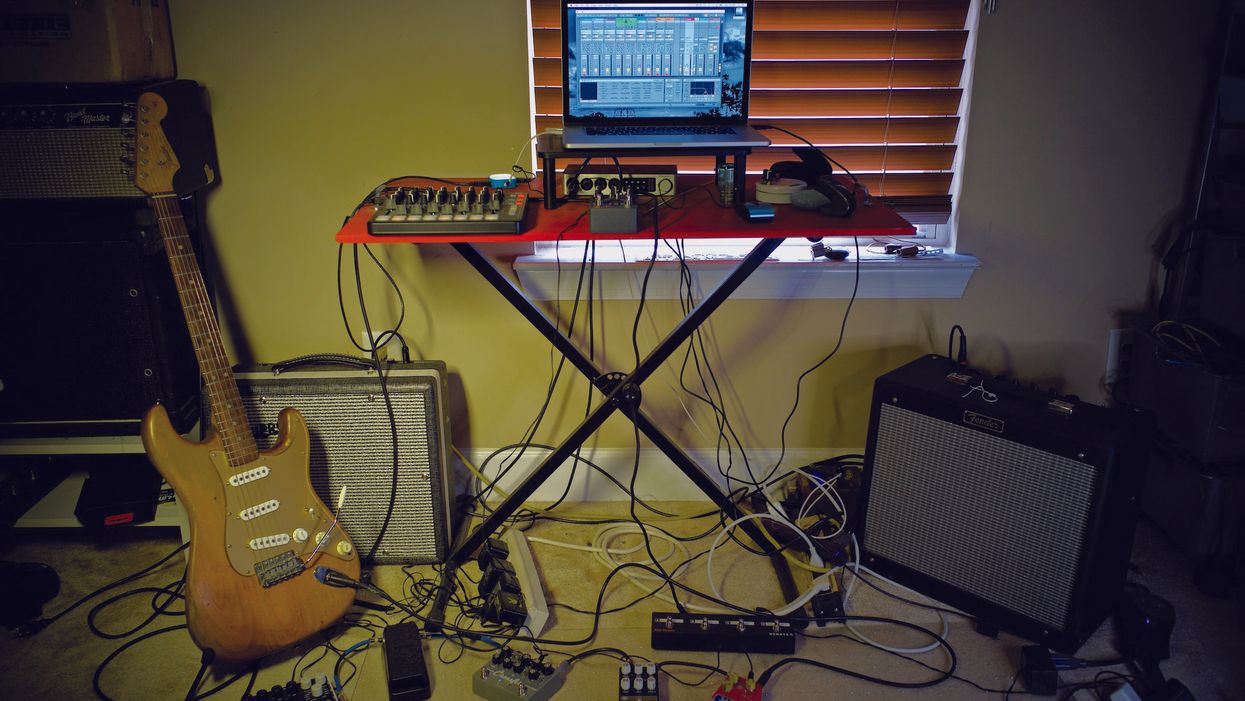
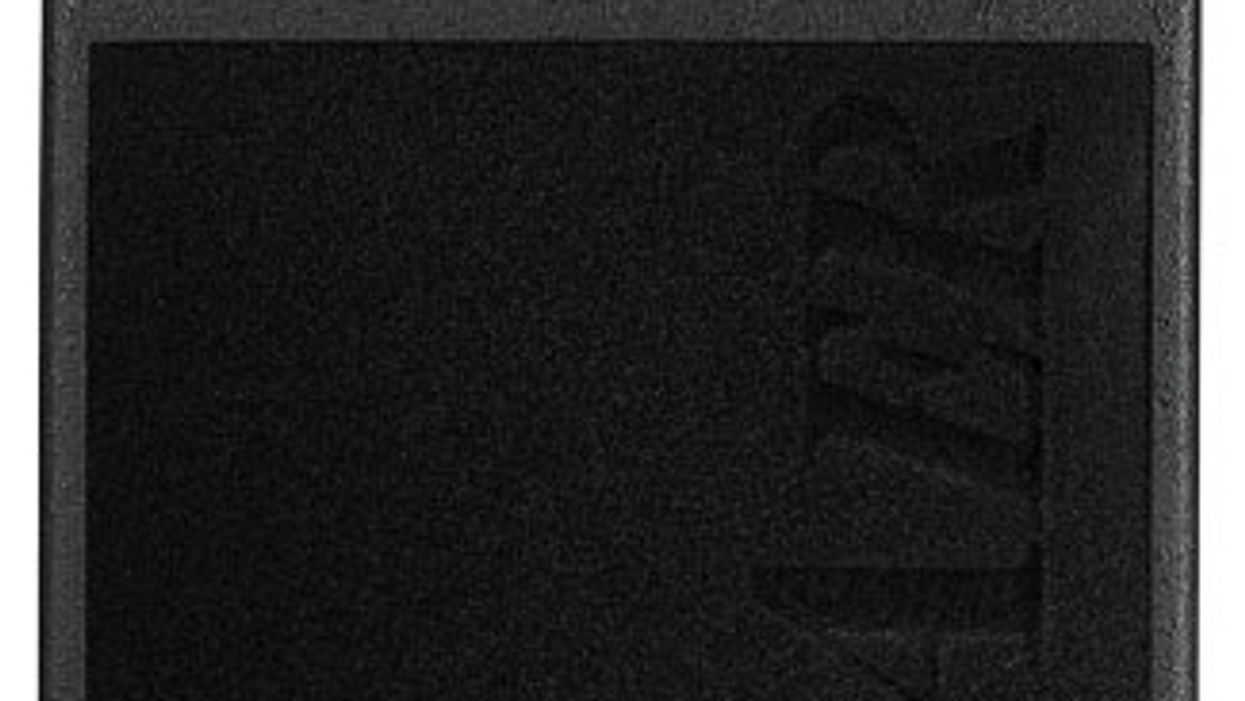
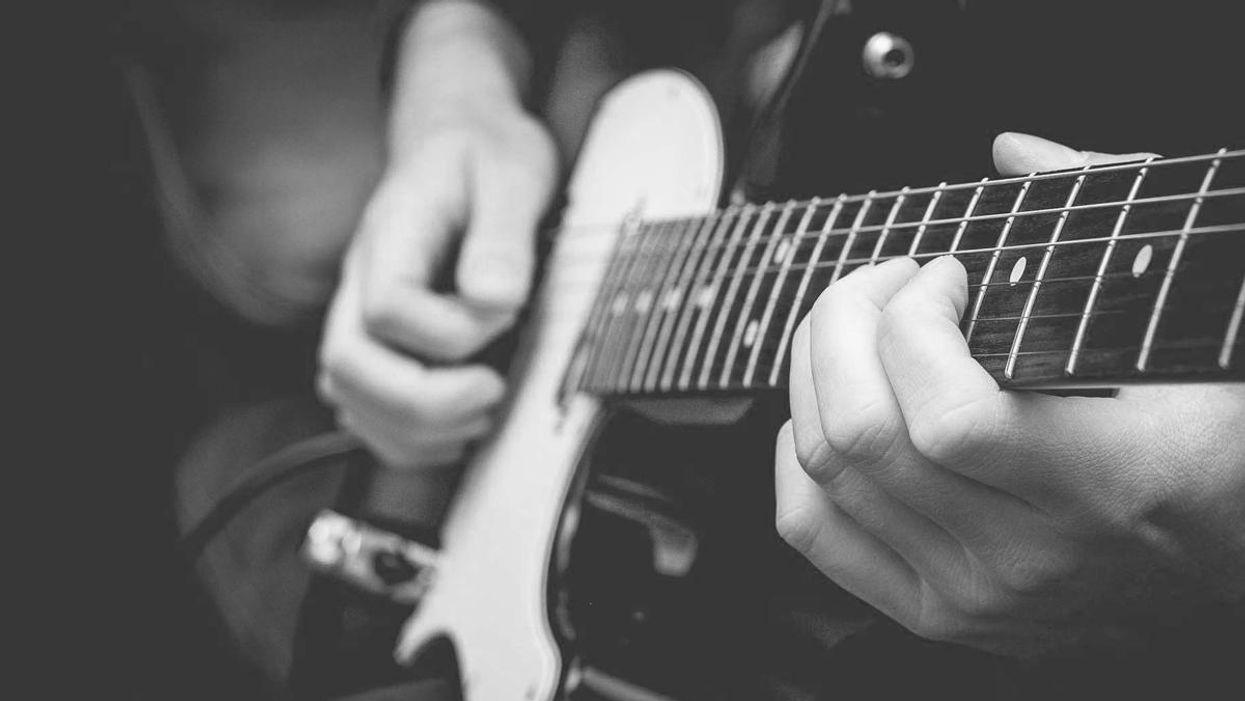
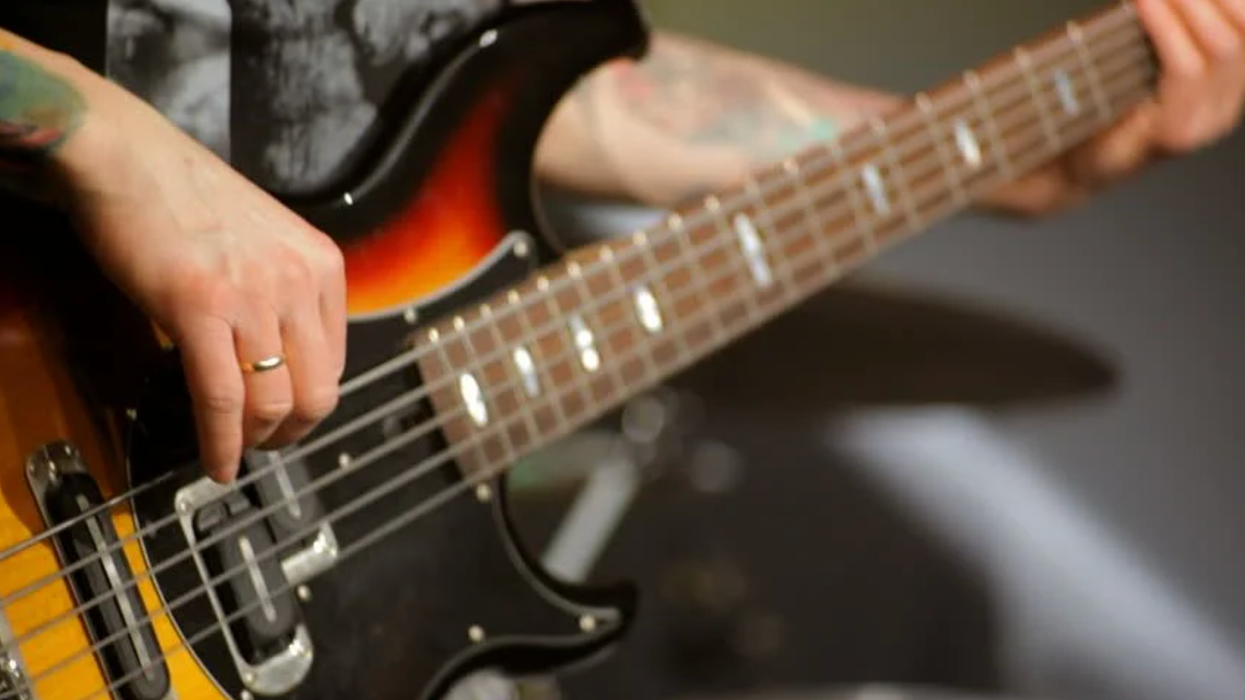
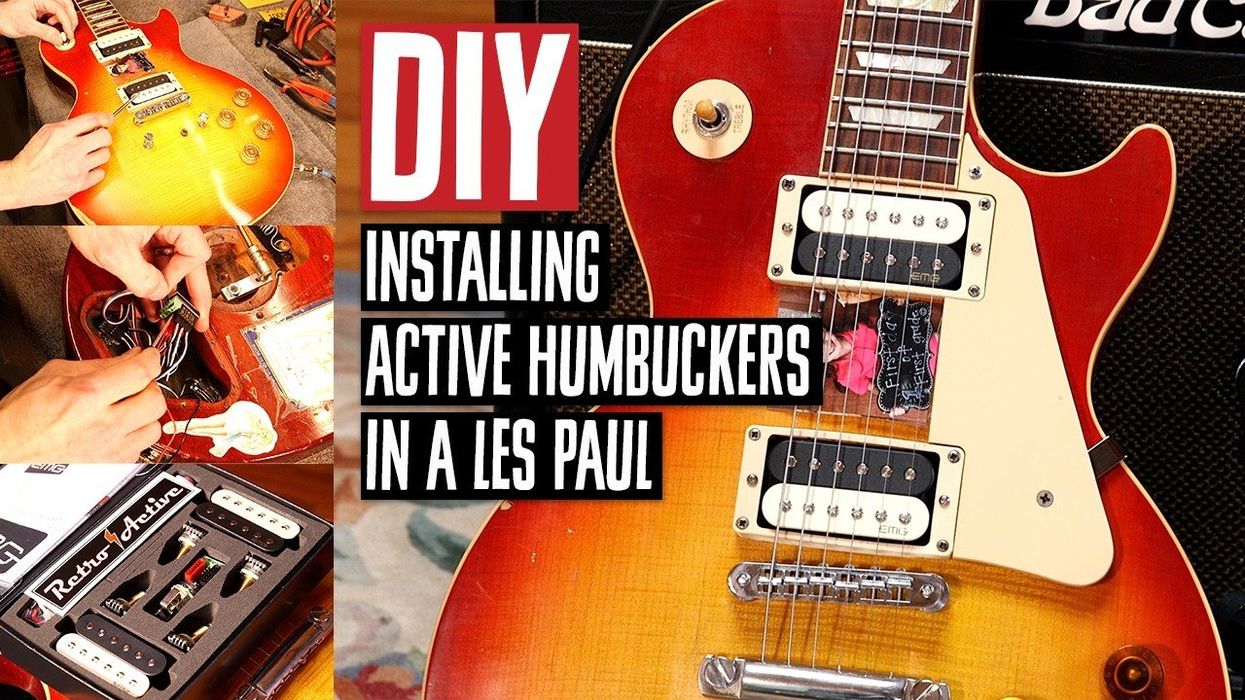


![Rig Rundown: Russian Circles’ Mike Sullivan [2025]](https://www.premierguitar.com/media-library/youtube.jpg?id=62303631&width=1245&height=700&quality=70&coordinates=0%2C0%2C0%2C0)

